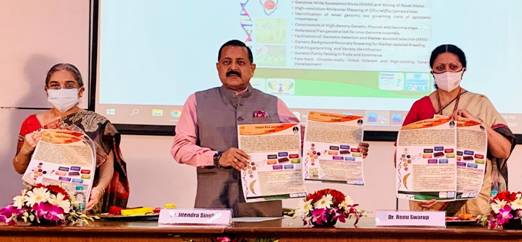Union Minister Dr Jitendra Singh says, India will be within the top 5 countries Globally and be recognized as a Global Bio-manufacturing Hub by 2025
New Delhi: Union Minister of State (Independent Charge) Science & Technology; Minister of State (Independent Charge) Earth Sciences; MoS PMO, Personnel, Public Grievances, Pensions, Atomic Energy and Space, Dr Jitendra Singh today said that India will be within the top 5 countries Globally and be recognized as a Global Bio-manufacturing Hub by 2025. He said, India’s Bio-Economy is on way to achieve 150-billion-dollar target from the current 70 billion-dollar to contribute effectively to Prime Minister’s vision of a 5 trillion-dollar economy by 2024-25. He was speaking here after releasing the Genetic Version of Indian rice and chickpea (DNA panArray) developed by National Institute of Plant Genome Research (NIPGR).
Referring to Prime Minister’s 75th Independence Day Speech from Red Fort, Dr Jitendra Singh said, the roadmap for the next 25 years will be determined by scientific and technological innovations and scientific prowess in all walks of life and called upon young scientists to walk the talk. He said, this will be possible through a very well-articulated Vision, Mission and Goals, driven through a set of well-defined strategies and a clearly laid out implementation Action plan put forth by the Government.
Dr Jitendra Singh said that the two DNA chips for rice and chickpea, IndRA and IndiCA are the first Pan-Genome genotyping arrays in these two crops and will tap the huge potential of Indian plant biodiversity and genomic diversity towards food and nutritional security of the Nation. He said, along with the other research platforms established by DBT in this institute, such as, the National Genomics and Genotyping Facility (NGGF), State of the Art Advanced Proteomics and Metabolomics Platforms and Plant Transformation Platforms, this Translational Facility and the Chips will tap the huge potential of Indian agricultural biodiversity towards achieving the goals of the National mission programs and SDG zero hunger goal.
Dr Jitendra Singh pointed out the various Missions to achieve the Bio-Hub Goal by 2025 like Mission mode programme in “Germplasm characterisation in major crop species, Developing high yielding, Climate-resilient, Disease resistant and Nutrient-rich crops towards the second green revolution, Applying gene editing technology for improving crop varieties, One Health Mission on AMR for livestock and zoonotic Diseases, National Nutrition Mission on Fortified and Functional Foods, Phytopharma Mission for development of affordable phyto-pharmaceutical drugs and Mission on Waste to Value Technologies.
The Minister also inaugurated “NIPGR First Translational Facility Network for Speed Breeding and High Throughput (HTP) Field Phenotyping”. Referring to NIPGR’s First Translational Facility Network for Speed Breeding and High Throughput (HTP) Field Phenotyping at the campus of Bharat Immunologicals and Biologicals Corporation Limited (BIBCOL), Bulandshahr, UP, Dr Jitendra Singh said, Genomics-assisted breeding is a rapidly emerging strategy for ensuring global food and nutrition security as well as for achieving future sustainable agriculture. He said, speed breeding technique shortens the breeding cycle by promoting quick growth and development and rapid generation advancement (even up to 4-6 generations per year) of crop plants. Speed breeding has been demonstrated in wheat, barley, chickpea, pea, canola and peanut in fully enclosed, controlled-environment growth chambers with supplementary environment, he added.
Dr Jitendra Singh said that NIPGR is an autonomous institute of the Department of Biotechnology (DBT) is now recognized as an international centre of excellence in plant science. He said, the institute’s scientists and students have developed value added crops for better human nutrition and adaptation to changing climate for higher productivity using various tools of biotechnology, such as, gene editing, genetic engineering and molecular assisted breeding.
He also noted with satisfaction that very recently, institute has developed a device for enhancing shelf life of fruits and vegetables and established its first Start up “Fruvetech”.
Dr Jitendra Singh said that Biotech Missions have been launched to align with the national and global priorities and give a fillip to the National Development Plans (NDP) and Sustainable Development Goals (SDG). He said, Biotech missions thus ensure that the efforts made in the field of biotechnology converge with other socio-economic efforts being made towards the end goal of achieving sustainable development under the ‘Atal Jai Anusandhan Biotech (UNATI) Mission’ including ‘POSHAN Abhiyan’ and Mission on ‘Combating Pests and Pathogens’.
Finally, Dr Jitendra Singh exhorted the Scientific Community to focus on 4 major verticals:
Building capacities both human resource and infrastructure to cater to the current needs and also to the future emerging technologies
Strengthening and nurturing of a strong basic research innovation driven ecosystem across Research Institutes and Laboratories, both public and private sector, with complete engagement of Startups, Small Industry, Large Industry and also reaching out to tier 2 and tier 3 cities.
The third major focus is on promoting the translation and product development commercialization ecosystem which necessarily needs to engage public and private sector and also encourage PPP models of co- development. This will require special focus on moving research leads from Laboratory towards technology development.
The balance between basic and translational research needs to be maintained to ensure that we have a robust pipelines of new knowledge, which helps us to take the translational work forward.

